Top 10 Online Courses to Learn Algorithms
Are you wondering which remote classroom to attend? You have spare time and want to broaden your horizon about a specific field of study whilst just staying at ... read more...home. Thus, to satisfy the burgeoning demand for online yet qualifying courses, Toplist has complied a rundown of the Online Courses to Learn Algorithms offered by the famous companies, top organizations and knowledgeable instructors across the globe for who in need!!!
-
Algorithms are at the heart of computer science, and the subject offers a wealth of both practical and intellectual applications. This specialization provides an overview of algorithms for students who have some programming expertise. As one of the Online Courses to Learn Algorithms, Algorithms Specialization offered by Stanford University is rigorous, but it prioritizes conceptual knowledge and large picture thinking above low-level implementation and mathematical specifics. You'll be well-prepared to ace technical interviews and converse fluently about algorithms with other programmers and computer scientists after completing this specialization.
The instructor's bio: Tim Roughgarden has been a professor at Stanford University's Computer Science Department since 2004. Algorithms and their applications are a subject on which he has taught and published extensively.This course offers:
- Flexible Schedule: Set and maintain flexible deadlines.
- Certificate : Earn a Certificate upon completion
- 100% online
- Intermediate Level
- Approx. 4 months to complete: Suggested pace of 4 hours/week
- Subtitles: English, Arabic, French, Portuguese (European), Italian, Vietnamese, German, Russian, Spanish
Coursera Rating: 4.8/5
Enroll here:https://www.coursera.org/specializations/algorithms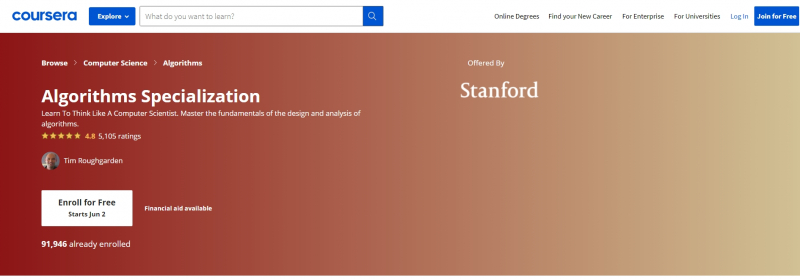
https://www.coursera.org 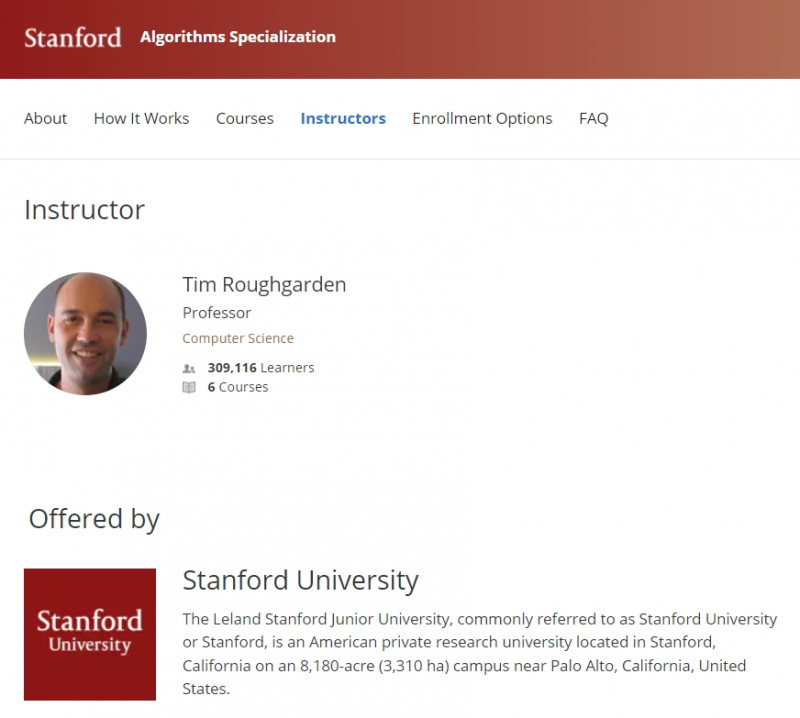
https://www.coursera.org - Flexible Schedule: Set and maintain flexible deadlines.
-
Princeton Institution is a private research university in the United States, based in Princeton, New Jersey. It is one of the Ivy League's eight universities, as well as one of the nine Colonial Colleges established prior to the American Revolution.
This course covers the fundamentals of algorithms and data structures that every serious programmer should know, with a focus on applications and scientific performance analysis of Java implementations. The first part of the course covers basic data structures, sorting, and searching techniques. The second part of the book focuses on graph and string processing algorithms.
This course includes all of the features for free. It doesn't come with a certificate when you finish it.This course offers:
- Flexible deadlines: Reset deadlines in accordance to your schedule.
- Certificate : Earn a Certificate upon completion
- 100% online
- Beginner Level
- Approx. 54 hours to complete
- Subtitles: Arabic, French, Portuguese (European), Italian, Vietnamese, Korean, German, Russian, English, Spanish
Coursera Rating: 4.9/5
Enroll here: https://www.coursera.org/learn/algorithms-part1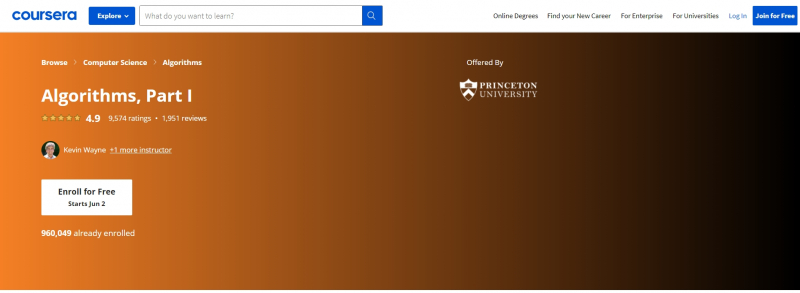
https://www.coursera.org 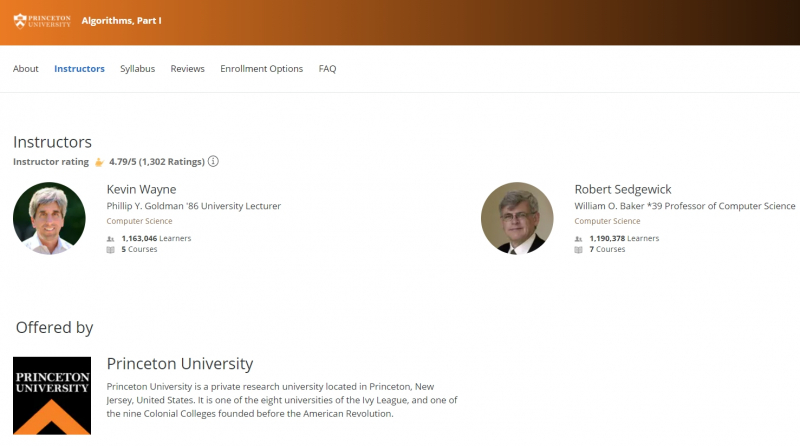
https://www.coursera.org - Flexible deadlines: Reset deadlines in accordance to your schedule.
-
"I don't comprehend things unless I try to write them," declared Donald Knuth, a computer science superstar. However, despite the fact that many good books and online courses on algorithms succeed in introducing algorithmic notions, they have yet to teach you how to apply algorithms, the critical computer science ability that you will need to master at your next job interview. This course assemble a diversified faculty that included world-renowned experts in theoretical and practical algorithms from UCSD (Daniel Kane, Alexander Kulikov, and Pavel Pevzner) as well as a former Google software engineer (Neil Rhodes).
Data Structures and Algorithms Specialization by University of California San Diego, one of the ,stands out among other good MOOCs on algorithms established by theoretical computer scientists because of its unique blend of abilities. This Specialization combines algorithmic theory, practice, and applications with software engineering, whereas these MOOCs focus on theory. By implementing roughly 100 coding challenges in a programming language of your choice, you will learn algorithms. No other online course in Algorithms, comes close to providing you with a wealth of programming tasks (and riddles!) that you might face at your next job interview. They spent over 3000 hours creating the challenges as an alternative to the typical multiple choice questions found in MOOCs.
This course offers:
- Flexible Schedule: Set and maintain flexible deadlines.
- Certificate : Earn a Certificate upon completion
- 100% online
- Intermediate Level
- Approx. 8 months to complete: Suggested pace of 6 hours/week
- Subtitles: English, Arabic, French, Portuguese (European), Italian, Vietnamese, German, Russian, Spanish
Coursera Rating: 4.6/5
Enroll here: https://www.coursera.org/specializations/data-structures-algorithms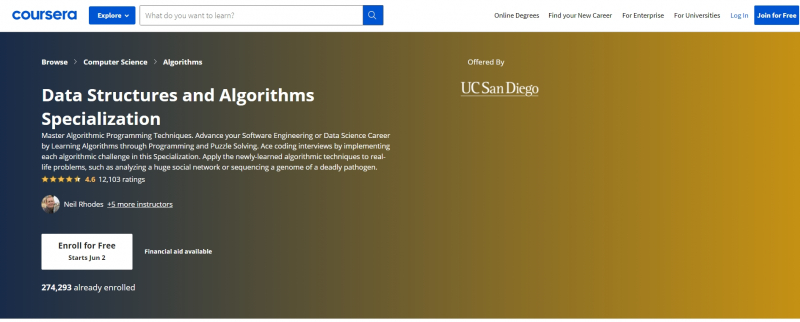
https://www.coursera.org 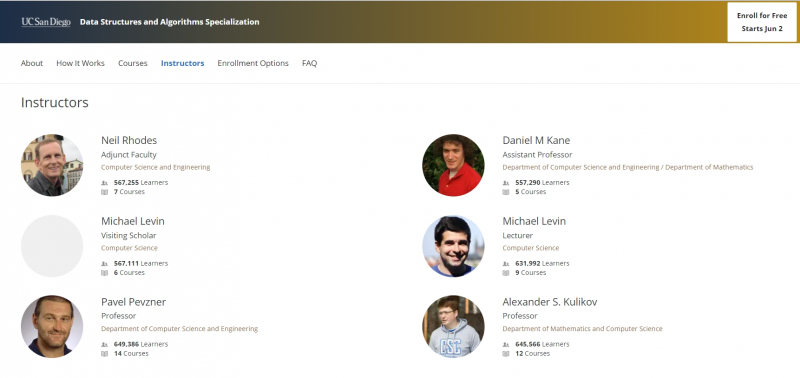
https://www.coursera.org - Flexible Schedule: Set and maintain flexible deadlines.
-
Being one of the Online Courses to Learn Algorithms, Algorithms, Part II offered by Princeton University covers the fundamentals of algorithms and data structures that every serious programmer should know, with a focus on applications and scientific performance analysis of Java implementations. The first part of the course covers basic data structures, sorting, and searching techniques. The second part of the book focuses on graph and string processing algorithms. This course includes all of the features for free. It doesn't come with a certificate when you finish it.
This course offers:
- Flexible deadlines: Reset deadlines in accordance to your schedule.
- Certificate : Earn a Certificate upon completion
- 100% online
- Intermediate Level
- Approx. 63 hours to complete
- Subtitles: Arabic, French, Portuguese (European), Italian, Vietnamese, Korean, German, Russian, English, Spanish
Coursera Rating: 4.9/5
Enroll here: https://www.coursera.org/learn/algorithms-part2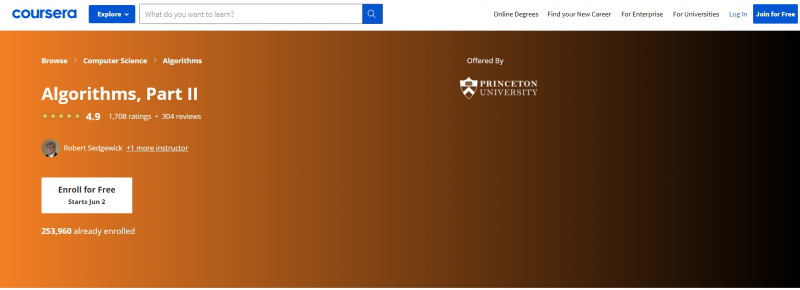
https://www.coursera.org 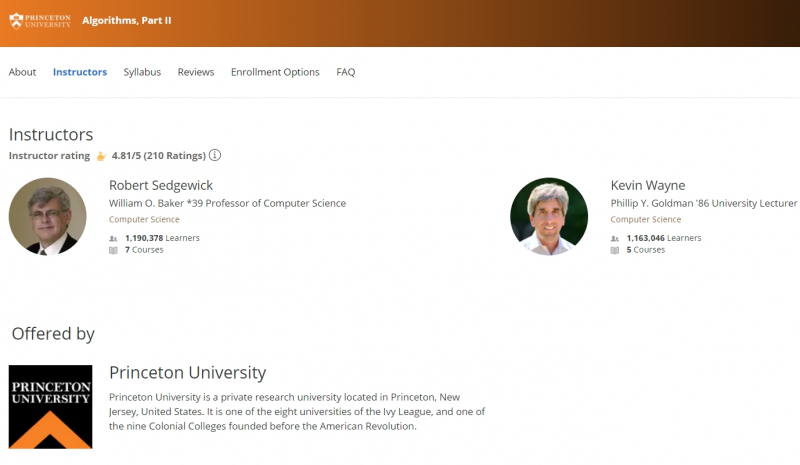
https://www.coursera.org - Flexible deadlines: Reset deadlines in accordance to your schedule.
-
Building fast and high-performance data science applications necessitates a thorough understanding of how data is arranged on a computer and how to perform operations like sorting, searching, and indexing efficiently. The principles of data structures and algorithms will be covered in this course, with a focus on data science applications. Data Science Foundations: Data Structures and Algorithms Specialization offered by University of Colorado Boulder is designed for students who have a general interest in developing applications that analyze huge volumes of data (no prior knowledge of data science is required) and are comfortable with the fundamentals of Python programming. Learners will learn about arrays, hash tables, heaps, trees, and graphs, as well as sorting, searching, traversal, and shortest path algorithms.
The courses in this specialization can be used toward CU Boulder's Master of Science in Data Science (MS-DS) degree, which is available on the Coursera platform. The MS-DS is an interdisciplinary degree that brings together faculty from the Applied Mathematics, Computer Science, Information Science, and other departments at CU Boulder. The MS-DS is excellent for persons with a broad variety of undergraduate education and/or professional experience in computer science, information science, mathematics, and statistics, as it is based on performance rather than application.
This course offers:
- Flexible Schedule: Set and maintain flexible deadlines.
- Certificate : Earn a Certificate upon completion
- 100% online
- Advanced Level : Calculus: derivatives and integrals. Probability theory: distributions, expectations, and moments. Some programming experience with Python.
- Approx. months to complete: Suggested pace of hours/week
- Subtitles: English
Coursera Rating: 4.7/5
Enroll here: https://www.coursera.org/specializations/boulder-data-structures-algorithms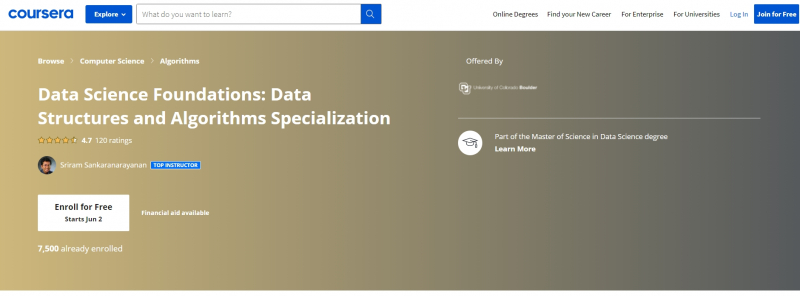
https://www.coursera.org 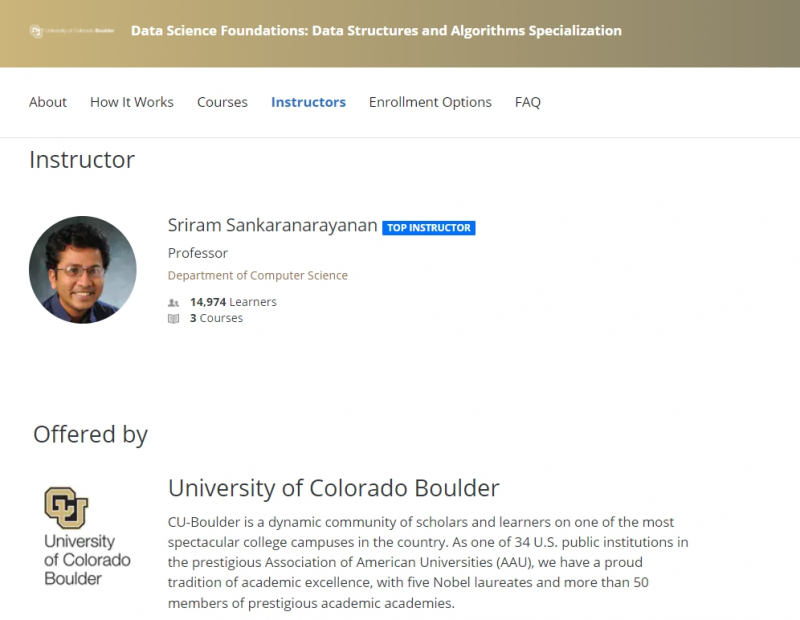
https://www.coursera.org - Flexible Schedule: Set and maintain flexible deadlines.
-
Analysis of Algorithms offered by Princeton University is one of the best Online Courses to Learn Algorithms.The calculus taught in this subject allows for precise quantitative predictions of massive combinatorial structures. Furthermore, the symbolic technique is introduced in the context of applications in the study of algorithms and basic structures such as permutations, trees, strings, words, and mappings.
Analysis of Algorithms offered by Princeton University includes all of the features for free. It doesn't come with a certificate when you finish it.This course offers:
- Flexible deadlines: Reset deadlines in accordance to your schedule.
- Certificate : Earn a Certificate upon completion
- 100% online
- Advanced Level
- Approx. 21 hours to complete
- Subtitles: Arabic, French, Portuguese (European), Italian, Vietnamese, German, Russian, English, Spanish
Coursera Rating: 4.5/5
Enroll here: https://www.coursera.org/learn/analysis-of-algorithms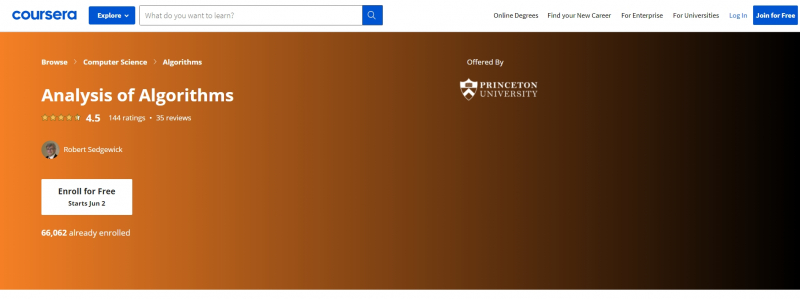
https://www.coursera.org 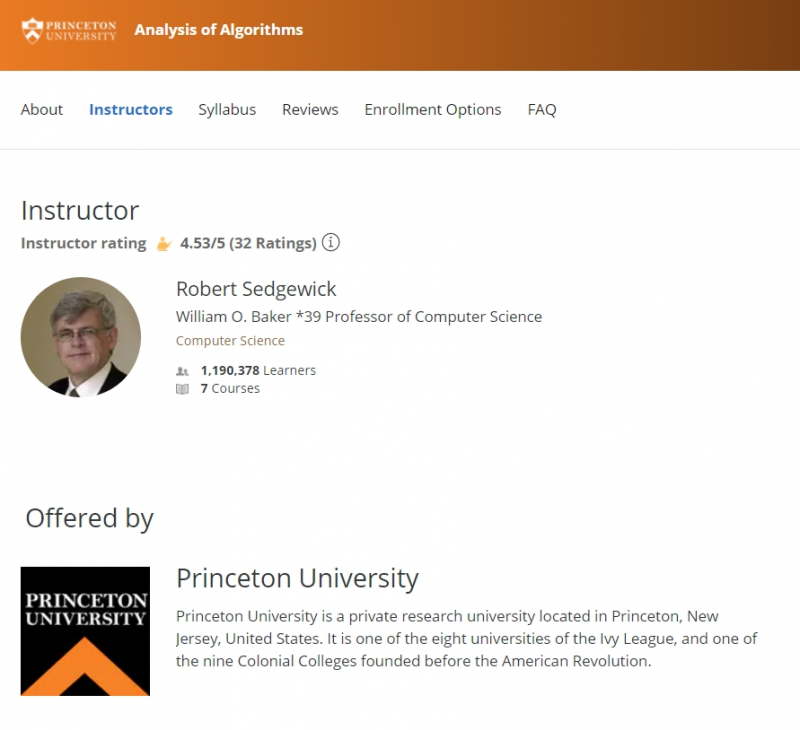
https://www.coursera.org - Flexible deadlines: Reset deadlines in accordance to your schedule.
-
Tsinghua University, established in 1911, is one of Asia's most distinguished institutions. Tsinghua University has 19 schools and 55 departments, including faculties of science, engineering, humanities, social sciences, architecture, management, law, medicine, arts, and design. Tsinghua University is China's top advanced learning institution, dedicated to excellence in teaching, research, and social services. Tsinghua University has around 35,000 students and approximately 3,200 staff members, including 3,500 international students from 108 countries. Many brilliant intellectuals, renowned businesses, and famous leaders among its 170,000 alumni have played vital roles in China's development.
Tsinghua University's Data Structures and Algorithms Specialization is one of the best online courses for learning algorithms. Data structures are the foundations of efficient algorithms and play an important role in computer science. This specialization delves into the principles and methodologies of data structure design and implementation. You'll gain the abilities you'll need to create algorithms and analyze their performance. This speciality covers everything from basic data structures to latest research findings.
This course offers:
- Flexible Schedule: Set and maintain flexible deadlines.
- Certificate : Earn a Certificate upon completion
- 100% online
- Intermediate Level
- Approx. 6 months to complete: Suggested pace of 5 hours/week
- Subtitles: Chinese (Simplified)
Coursera Rating: 3.5/5
Enroll here: https://www.coursera.org/specializations/data-structures-algorithms-tsinghua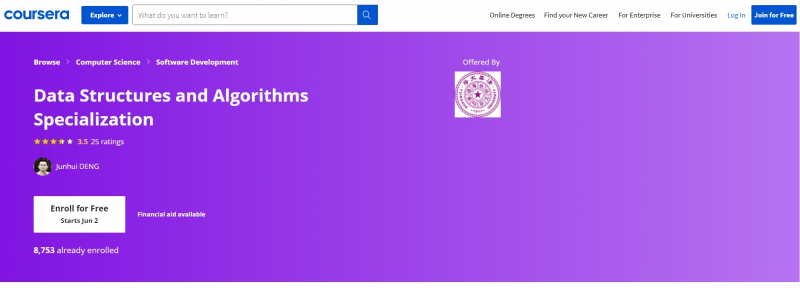
https://www.coursera.org/ 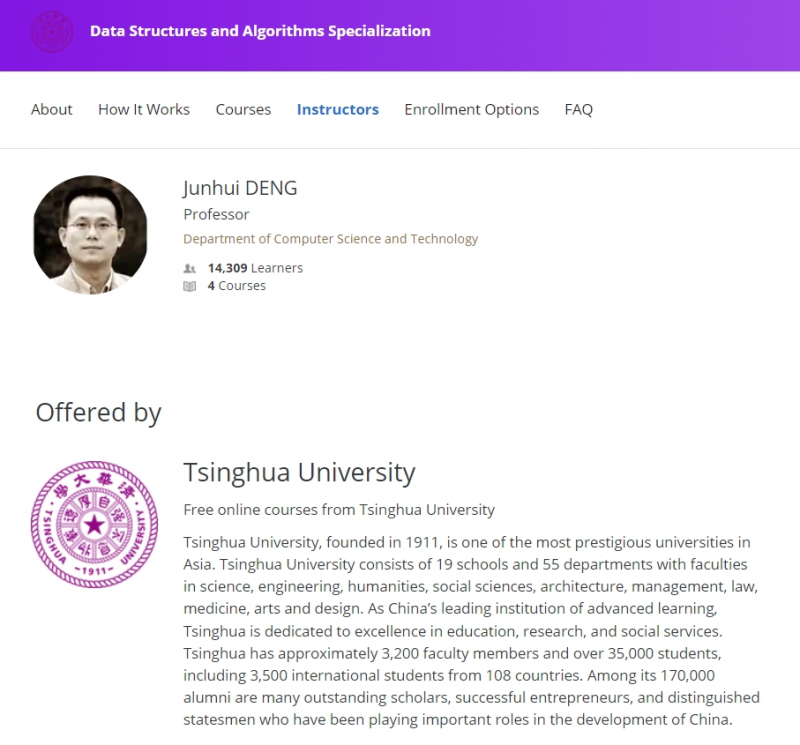
https://www.coursera.org/ - Flexible Schedule: Set and maintain flexible deadlines.
-
You've mastered the basics of algorithms in earlier courses in this online specialization, and now you're ready to move on to more sophisticated problems and methods to solve them. Advanced algorithms build on the foundations of fundamental algorithms while also including novel concepts. Learners will begin with network flows, which are used in both common applications like as optimum matchings, discovering disjoint pathways, and aircraft scheduling, as well as less common applications such as picture segmentation in computer vision.
The students will then go on to linear programming, which may be used to optimize budget allocation, portfolio optimization, and determining the cheapest diet that meets all needs, among other things. The students then analyze fundamentally difficult problems for which no specific good solution exists (and is unlikely to exist), as well as how to address them in reality. The course concludes with a brief overview of streaming algorithms, which are widely employed in Big Data processing. Such algorithms are typically designed to process large datasets without even being able to store them.
This course offers:
- Flexible deadlines: Reset deadlines in accordance to your schedule.
- Certificate : Earn a Certificate upon completion
- 100% online
- Advanced Level
- Approx. 27 hours to complete
- Subtitles: Arabic, French, Portuguese (European), Italian, Vietnamese, German, Russian, English, Spanish
- Course 5 of 6 in the Data Structures and Algorithms Specialization
Coursera Rating: 4.6/5
Enroll here:https://www.coursera.org/learn/advanced-algorithms-and-complexity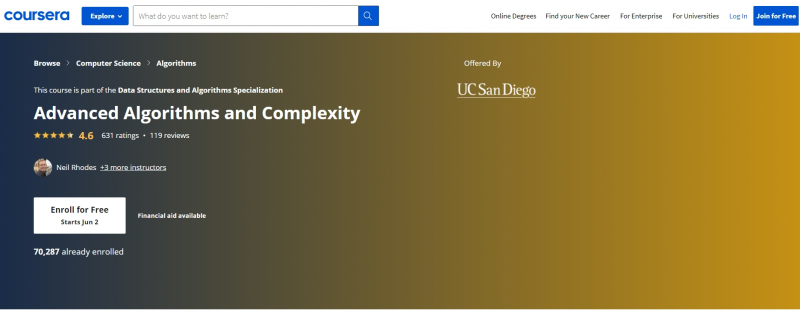
https://www.coursera.org 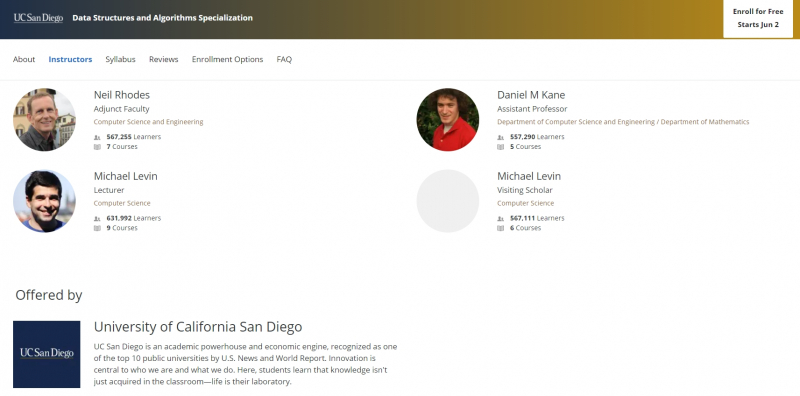
https://www.coursera.org - Flexible deadlines: Reset deadlines in accordance to your schedule.
-
Experienced computer scientists examine and solve computational issues at a higher degree of abstraction than any programming language. This two-part course expands on the principles acquired in Principles of Computing course and is aimed at teaching students the mathematical concepts and technique of "Algorithmic Thinking," which will enable them to create simpler, more efficient solutions to real-world computational issues.
In part one of this course, students will learn about algorithmic efficiency and how to apply it to a variety of graph theory problems. Students will develop many essential graph algorithms in Python and then utilize these algorithms to analyze two enormous real-world data sets as the course's centerpiece. The major goal of these assignments is to comprehend the relationship between the algorithms and the structure of the data sets that these algorithms are analyzing.
Students should be familiar with building intermediate-size (300+ line) Python programs and have a basic understanding of searching, sorting, and recursion. Students should also have a strong academic foundation, including algebra, precalculus, and a working knowledge of the arithmetic ideas presented in "Principles of Computing."This course offers:
- Flexible deadlines: Reset deadlines in accordance to your schedule.
- Certificate : Earn a Certificate upon completion
- 100% online
- Beginner Level
- Approx. 12 hours to complete
- Subtitles: Arabic, French, Portuguese (European), Greek, Italian, Vietnamese, Korean, German, Russian, English, Spanish, Telugu
- Course 5 of 7 in the Fundamentals of Computing Specialization
Coursera Rating: 4.6/5
Enroll here: https://www.coursera.org/learn/algorithmic-thinking-1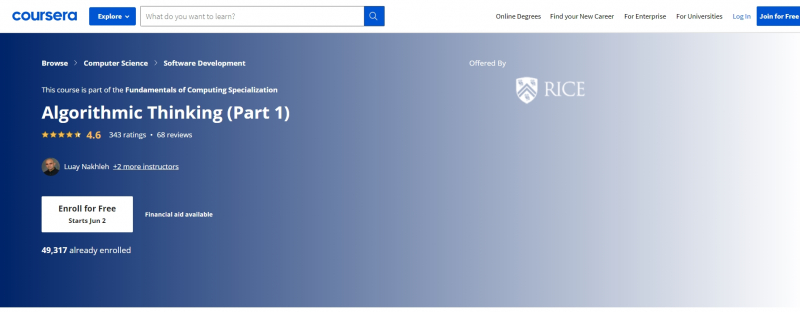
https://www.coursera.org/ 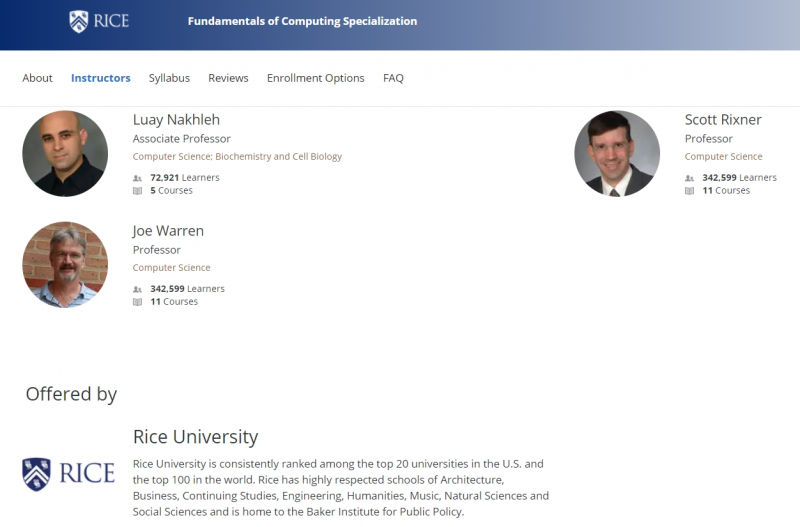
https://www.coursera.org/ - Flexible deadlines: Reset deadlines in accordance to your schedule.
-
Sorting and searching, divide and conquer, greedy algorithms, and dynamic programming are some of the core algorithmic approaches and ideas covered in this online course for computational issues that arise regularly in practical applications.
Learners will study a lot of theory, such as how to sort data and how it helps with searching; how to break down a complex problem into smaller pieces and solve them recursively; when it's better to continue greedily; and how dynamic programming is utilized in genomic studies. You'll get hands-on experience solving computational issues, creating new algorithms, and efficiently implementing solutions (so that they run in less than a second).
This course offers:
- Flexible deadlines: Reset deadlines in accordance to your schedule.
- Certificate : Earn a Certificate upon completion
- 100% online
- Intermediate Level
- Approx. 40 hours to complete
- Subtitles: Arabic, French, Portuguese (European), Italian, Vietnamese, German, Russian, English, Spanish
- Course 1 of 6 in the Data Structures and Algorithms Specialization
Coursera Rating: 4.6/5
Enroll here: https://www.coursera.org/learn/algorithmic-toolbox
https://www.coursera.org 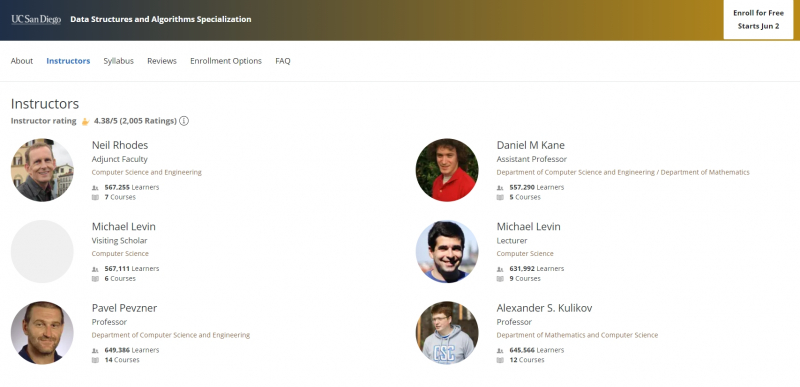
https://www.coursera.org - Flexible deadlines: Reset deadlines in accordance to your schedule.




























